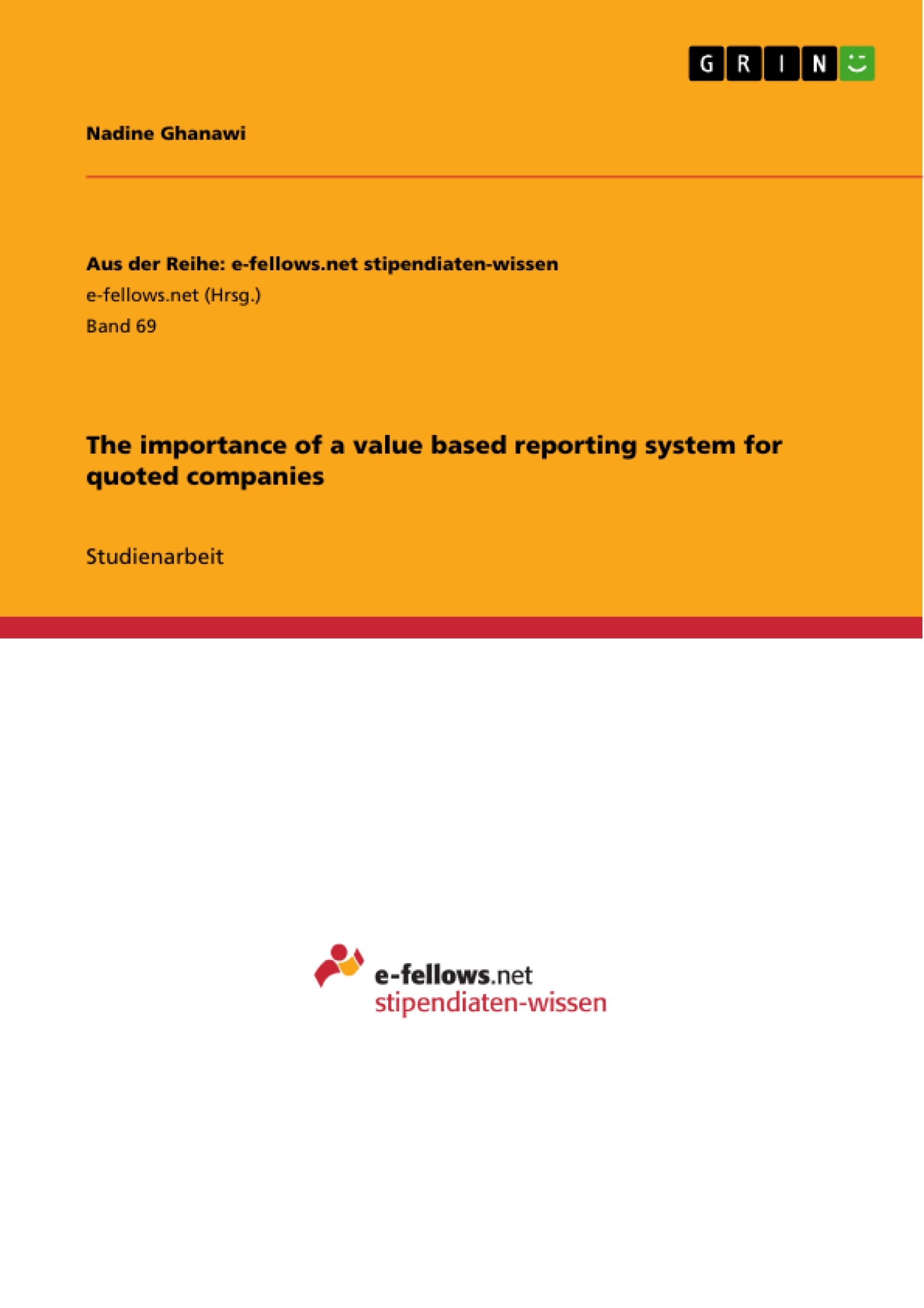Quoted companies are constituted by their stockholders who invest in the company. Definitely, a precondition for an investment decision is the trust of the investors in the ability of the company to sustainably generate returns and to stand its ground at the market over the long term. With regards to globalization in particular, the internationalization of markets and integration of different industries led to a growing information need of investors that currently presents the corporate communications with new challenges. Therefore the external corporate reporting has a special importance as investors and analysts claim reliable and relevant information to be taken as a basis for corporate valuation and price determination.
1. Introduction
1.1 Problem Description
1.2 Objectives
1.3 Methodology
2. Characterization of Value Reporting
2.1 Definition and Principles
2.2 Prerequisites and Instruments of Value Enhancement Management
2.2.1 Investor Relations
2.2.2 Internal Control
3. Use of Value Reporting Systems
3.1 Concepts
3.2 Corporate Valuation according to the Shareholder Value Approach
4. Conclusion
Inhaltsverzeichnis
- 1. Introduction
- 1.1 Problem Description
- 1.2 Objectives
- 1.3 Methodology
- 2. Characterization of Value Reporting
- 2.1 Definition and Principles
- 2.2 Prerequisites and Instruments of Value Enhancement Management
- 2.2.1 Investor Relations
- 2.2.2 Internal Control
- 3. Use of Value Reporting Systems
- 3.1 Concepts
- 3.2 Corporate Valuation according to the Shareholder Value Approach
- 4. Conclusion
Zielsetzung und Themenschwerpunkte
Diese Arbeit befasst sich mit der Bedeutung eines wertebasierten Berichtssystems für börsennotierte Unternehmen. Sie analysiert die Faktoren, die den Shareholder Value beeinflussen, und untersucht den zunehmenden Einfluss immaterieller Vermögenswerte auf die Unternehmensbewertung.
- Definition und Prinzipien von Value Reporting
- Voraussetzungen und Instrumente für ein Value Enhancement Management
- Anwendung von Value Reporting-Systemen in der Praxis
- Corporate Valuation im Shareholder Value Ansatz
- Bedeutung immaterieller Vermögenswerte für die Unternehmensbewertung
Zusammenfassung der Kapitel
Das erste Kapitel stellt die Problematik des Value Reporting vor und definiert die Ziele der Arbeit. Im zweiten Kapitel werden Definition und Prinzipien des Value Reporting erläutert. Es werden auch die notwendigen Voraussetzungen und Instrumente für ein erfolgreiches Value Enhancement Management, wie Investor Relations und Internal Control, vorgestellt. Das dritte Kapitel befasst sich mit der konkreten Anwendung von Value Reporting-Systemen und beleuchtet den Shareholder Value Ansatz zur Unternehmensbewertung.
Schlüsselwörter
Value Reporting, Shareholder Value, Unternehmensbewertung, Immaterielle Vermögenswerte, Investor Relations, Internal Control, Corporate Governance, Corporate Valuation, Financial Reporting, IASB, US-GAAP, DAX, DAI, PwC.
Häufig gestellte Fragen
Was ist Value Reporting?
Value Reporting ist ein Berichtssystem, das über die rein finanzielle Berichterstattung hinausgeht und Informationen liefert, die den tatsächlichen Wert und das Zukunftspotenzial eines Unternehmens widerspiegeln.
Warum ist wertebasierte Berichterstattung für Investoren wichtig?
Investoren benötigen verlässliche Informationen über die Fähigkeit eines Unternehmens, nachhaltig Renditen zu erwirtschaften, insbesondere im Hinblick auf immaterielle Vermögenswerte.
Was ist der Shareholder Value Ansatz?
Dieser Ansatz stellt die Maximierung des Unternehmenswerts aus Sicht der Anteilseigner (Aktionäre) in das Zentrum der Unternehmensführung und -bewertung.
Welche Rolle spielen immaterielle Vermögenswerte?
Immaterielle Werte wie Marken, Patente oder Humankapital machen oft einen Großteil des Marktwerts aus, werden aber in klassischen Bilanzen oft unzureichend dargestellt.
Was sind Investor Relations im Kontext von Value Reporting?
Investor Relations ist das Instrument zur Kommunikation dieser wertebasierten Informationen an den Kapitalmarkt, um Vertrauen bei Analysten und Anlegern aufzubauen.
- Quote paper
- Nadine Ghanawi (Author), 2011, The importance of a value based reporting system for quoted companies, Munich, GRIN Verlag, https://www.grin.com/document/174585



